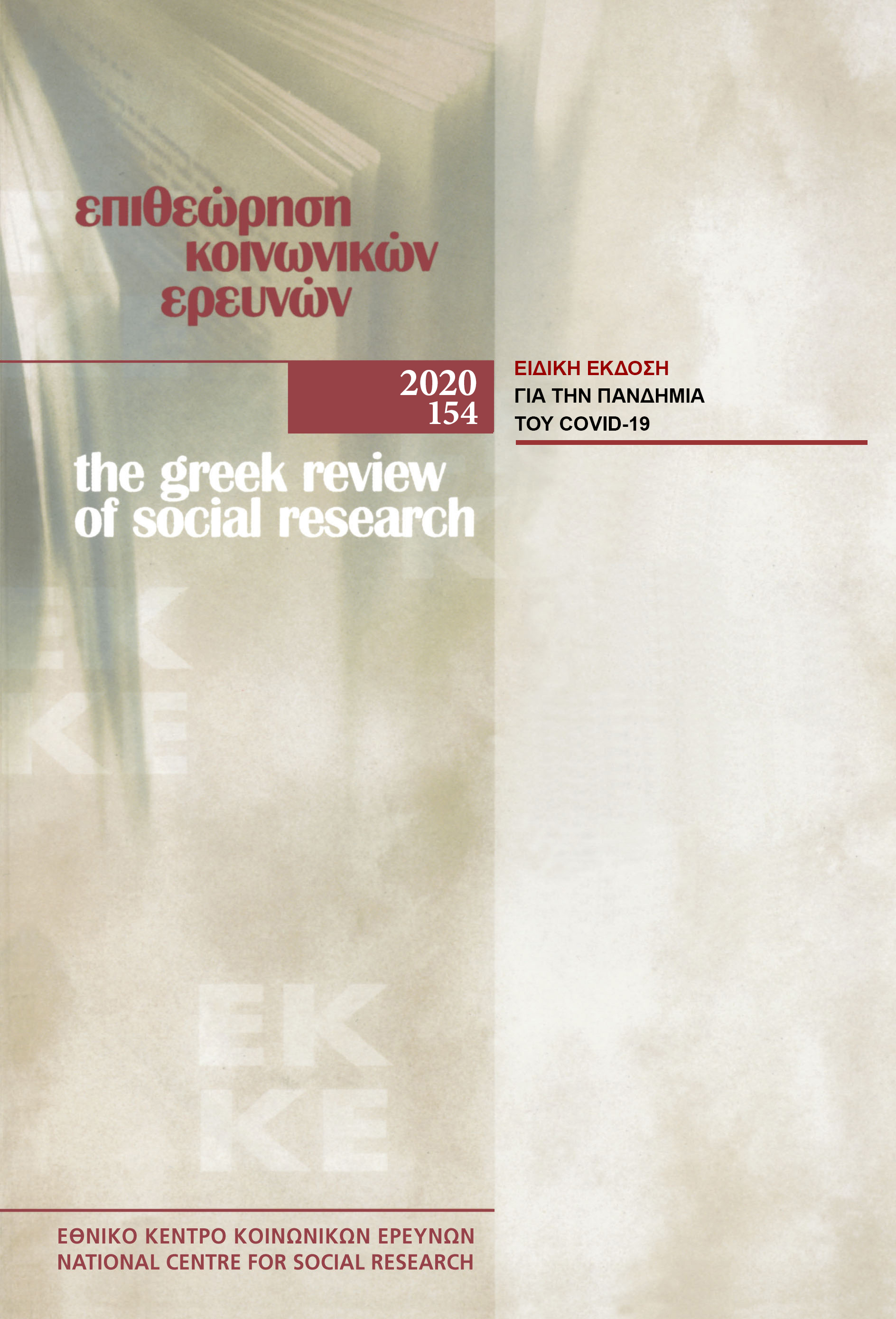Κράτος, κοινωνία και μέσα επικοινωνίας στην εποχή του κορωνοϊού

Περίληψη
Το ιστορικό παγκόσμιο συμβάν της πανδημίας του Covid-19 κατέστησε φανερό, για μια ακόμη φορά, το γεγονός ότι ζούμε σε μια συνδεδεμένη παγκόσμια κοινωνία, καθώς και ότι, στις αρχές του 21ου αιώνα, οι υγειονομικές κρίσεις δεν εντάσσονται πια στα φυσικά φαινόμενα, αλλά μπορούν να θεωρηθούν ως αποσταθεροποιητικά κοινωνιακά γεγονότα και ως καταστροφές που έχουν δημιουργήσει οι ίδιοι οι άνθρωποι. Επιπλέον, η πανδημία ανέδειξε την τεράστια πολυπλοκότητα ενός παγκόσμιου συστήματος και τη μη γραμμική δυναμική του, δοθέντος ότι η θεμελιώδης μορφή της παγκόσμιας κοινωνίας αλλά και των εθνικών κοινωνιών είναι τα επικοινωνιακά δίκτυα, στα οποία σημειώνεται διαφοροποίηση και αναπαραγωγή ή μετασχηματισμός μιας ποικιλίας σχεσιακών δομών. Με δεδομένο ότι η κοινωνία των δικτύων είναι επίσης μια ψηφιακή κοινωνία των δικτύων, η οποία διαμορφώνει σχεσιακά τα νέα ψηφιακά μέσα στο πλαίσιο όλων των άλλων μορφών επικοινωνίας, στο επίκεντρο της παρούσας έρευνας βρίσκεται ο κρίσιμος ρόλος των συναισθημάτων (εμπιστοσύνη, υπευθυνότητα, φόβος) και των Μέσων στις διαδικασίες που αφορούν στην πολιτική πληροφορίας (information policy) αλλά και στην πρόσληψη της πανδημίας από τους πολίτες, καθώς και η επίδραση των Μέσων στην αναδυόμενη «κοινωνία της πανδημίας».
Λεπτομέρειες άρθρου
- Πώς να δημιουργήσετε Αναφορές
-
Tsekeris, C., & Zeri, P. (2020). Κράτος, κοινωνία και μέσα επικοινωνίας στην εποχή του κορωνοϊού. Επιθεώρηση Κοινωνικών Ερευνών, 154, 109–128. https://doi.org/10.12681/grsr.24518
- Ενότητα
- Άρθρα

Αυτή η εργασία είναι αδειοδοτημένη υπό το CC Αναφορά Δημιουργού – Μη Εμπορική Χρήση 4.0.
Οι συγγραφείς των άρθρων που δημοσιεύονται στην Επιθεώρηση Κοινωνικών Ερευνών διατηρούν τα δικαιώματα πνευματικής ιδιοκτησίας επί των άρθρων τους, δίνοντας στο περιοδικό το δικαίωμα της πρώτης δημοσίευσης. Άρθρα που δημοσιεύονται στην Επιθεώρηση Κοινωνικών Ερευνών διατίθενται με άδεια Creative Commons 4.0 και σύμφωνα με την άδεια μπορούν να χρησιμοποιούνται ελεύθερα, με αναφορά στο/στη συγγραφέα και στην πρώτη δημοσίευση για μη κερδοσκοπικούς σκοπούς.
Το Εθνικό Κέντρο Κοινωνικών Ερευνών διατηρεί το δικαίωμα να δημοσιεύει, να αναπαραγάγει, να παρουσιάζει στο κοινό, να διανέμει και χρησιμοποιεί άρθρα που δημοσιεύονται στην Επιθεώρηση Κοινωνικών Ερευνών σε οποιοδήποτε μέσο και μορφή είτε μεμονωμένα είτε ως μέρη συλλογικών έργων, για όλο τον χρόνο διάρκειας προστασίας της πνευματικής ιδιοκτησίας και για όλες τις χώρες του κόσμου. Αυτό περιλαμβάνει ενδεικτικά και όχι αποκλειστικά το δικαίωμα δημοσίευσης των άρθρων σε τεύχη της Επιθεώρησης Κοινωνικών Ερευνών, αναπαραγωγής και διανομής μεμονωμένων αντιγράφων των άρθρων, αναπαραγωγής ολόκληρων των άρθρων σε άλλη έκδοση του Εθνικού Κέντρου Κοινωνικών Ερευνών, καθώς και αναπαραγωγής και διανομής των άρθρων ή περίληψης αυτών με χρήση πληροφορικού συστήματος αποθετηρίου.


